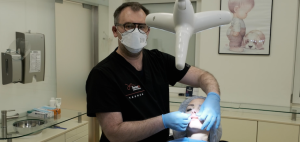
Poles ate more sweets in coronavirus pandemic
Researchers from the Medical University of Warsaw examined selected elements of diet and lifestyle of the adult Polish population before and during the COVID-19 pandemic. Total fat consumption increased, smokers came in, but no increase in alcohol consumption was seen.
The study began as early as 2017. on a representative sample of Poles (482 people) and was funded by the National Health Program. Initially, interviewers visited participating patients in person every 5-7 days to measure weight, waist and hip circumference, and blood pressure. Participants also completed a food frequency questionnaire in the presence of an interviewer and assessed their knowledge of nutrition and healthy lifestyles. Through the use of the Actigraph device, data were collected on the subjects' weekly physical activity.
– These were not declarative results, and we all know what a big difference this is. This is also the only Polish study so far, on a representative group of Poles, where there was a two-question interview about food intake in the past 24 hours. At the end of the last century, similar studies were conducted, but based on a single interview – Dr. Iwona Traczyk, head of the Department of Human Nutrition at the Medical University of Warsaw, said at a press conference held on Friday.
The outbreak of the COVID-19 pandemic meant that personal contact with survey participants had to be replaced with telephone contact, but this fortuitous event added to the value of the information collected – one can actually compare how Poles lived and how they ate before the pandemic, and whether it affected changes in healthy living habits.
Consumption of fat and sugar increased
Total fat consumption has increased. The average value of daily fat intake before the pandemic was 78 grams, and during – 83 grams. Similarly with sucrose – it was 56.6 and 64.5 grams respectively. – Increased intake of fats, cholesterol and sucrose indicates consumption of sweets, cakes – because there these ingredients are found together. Consumption of vegetable protein and dietary fiber has declined – Traczyk concluded.
Poles were more likely to supplement calcium and magnesium since the beginning of the pandemic. Consumption of B vitamins (riboflavin and niacin), vitamin E and vitamin C has increased.
In the healthy lifestyle category, the data are not optimistic. There has been an increase in the number of people reaching for tobacco who previously did not do so. Before the pandemic, 73% were non-smokers, during the pandemic, only 65% were already non-smokers Researchers, however, did not note a statistically significant increase in alcohol consumption. – We know that alcohol consumption is sensitive data and is sometimes more subject to error than others – Traczyk emphasized.
Less exercise, more sleep
Physical activity figures are worrisome, they said at the conference. The number of people who described their physical activity as "high" before the pandemic dropped from 8.5% to 1.2%. The number of people with "low" activity has increased from 37.8% to 50.8% – people previously classified as "moderate" active have flowed into this group.
Poles, on the other hand, spend more time in the pandemic sleeping. Percentage of people who sleep 7-8 hours on weekdays. rose from 67% to 75%. Also on the weekend, more people allow themselves to sleep more than 9 hours. (increase from 19% to 25.5%).
According to Dr. Iwona Traczyk, the results of the collected research can be used on many levels. – The research can be used very broadly – both for scientific and educational purposes, but also for building policies to improve public health, because these data indicate that the risk of chronic diseases may be increasing in the future – Traczyk concluded.
– Very often dentists, when talking to patients, talk about solutions. Instead, it is worth talking about the effect, not the solutions – says Mariusz Oboda, dental practice development trainer, in an interview with Dentonet.


